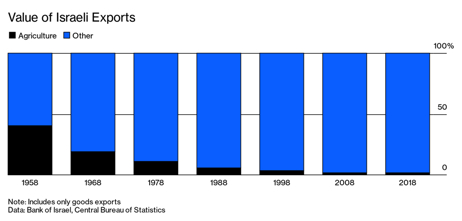From Citrus to Cyberspace
When was the last time you had a Jaffa Orange? As children we gushed with pride and boasted that the very best oranges in the supermarket were from Israel! The Jaffa Orange was a tangible (and tasty!) reminder of the miracle of Israel. The ability to irrigate and re-engineer agriculture produced results (and produce!) Out of the desert … oranges! Israel produced as much as 1.8 million tons of caitrus in the 1980’s. I’m telling you, that fruit has appeal! But times have changed. Annual Israeli citrus production has dropped about 75% since those years. More broadly as shown in the chart below, while agriculture was responsible for over 40% of the value of Israel’s exports in the late 1950’s, these days agriculture only amounts to about 2% of the value of everything Israel sends to the world. What happened?

The answer of course is that Israel has emerged as the Start Up Nation, investing in high tech and the knowledge economy to become a world powerhouse of creativity and innovation. With over 100 companies listed on the NASDAQ exchange, Israel has taken that most Jewish of resources – sechel – brains — and created a high-tech ecosystem rivaling both Silicon Valley and Route 128 in Boston. And we are not talking about garage start-ups that earn a few bucks and then fade away. The rate at which new Israeli “unicorns” – companies with valuations over a billion dollars (take that, Shark Tank) – is astonishing. In the first half of 2021, 24 new unicorns appeared in Israel! This is second only to the United States and amounts to twice the number of Chinese unicorns announced in the same time period. Nothing corny about that.
So, who are the leading Israeli companies, and what do they do? According to Dun & Bradstreet, the top Israeli companies include
• Teva Pharmaceuticals (with nearly 40,000 employees and total income near $18 billion).
• Intel Israel which serves as the development and manufacturing center for that Intel, as in the core processors found inside your computers, and also includes Mobileye which is responsible for Israeli-developed autonomous car technology).
• Elbit Systems which is a world leader in defense technology but has also adapted to dual-use purposes (for example, a helmet worn by fighter pilots has been adapted for use by surgeons).
• Check Point Software which leads the world in cyber security, from controlling e-mail spam to countering ransomware with applications throughout retail, government, healthcare, and education among others.
Looking at size is one way to measure the success of a company, but what about, oh, a company’s cool factor? If you want to find your way to a cool company…
• just ask Waze, which was acquired by Google for a unicorn-cool $1.15 billion back in 2013, and probably helps many of you navigate around town or across country.
• There’s also Mindspace, which is an Israeli answer to WeWork in creating boutique coworking spaces for startups and corporations alike.
• Instant messaging got its start in Israel with ICQ (I seek you), the famous program developed by Mirabilis that was purchased by AOL for a cool $407 million all the way back in 1998. So, it is no surprise that another Israeli instant messaging app, Viber, is according to Ha’aretz the most widespread app in Israel.
Finally, who do Israelis think are the best companies to work for? Again, the tech sector dominates. There’s:
• the website platform builder Wix that is used in almost 200 countries. Headquartered in Tel Aviv, Wix has offices in San Francisco, Sao Paulo, and Dublin.
• Another favorite is Payoneer, which developed and operates on of the world’s largest online money transfer platforms. You have used their software if you have sold something on Amazon, or shared a ride with Waze Carpool, or rented an apartment on Airbnb.
• Taboola is another exciting place to work. This company specializes in “recommendation engines” – think of it like a reverse search engine – instead of asking Google to find something for you, Taboola watches what you are doing online, for example what stories you are reading on CNN, and makes suggestions for where to go next. And “Taboolars” have migrated all over the world with offices in too many cities to name.
From citrus to cyberspace, Israel’s economy has transformed to meet the challenges of the 21st century. And while there are not as many Jaffa Oranges produced compared to the past, don’t worry, there’s still plenty of good food to eat in Israel, including lots of fresh fruit!
Note: given that this issue of Israel Matters is being produced just after Rosh Hashanah, we are going to pass over (!)
Eating like an Israeli
Shana Tova from Israel Matters!
